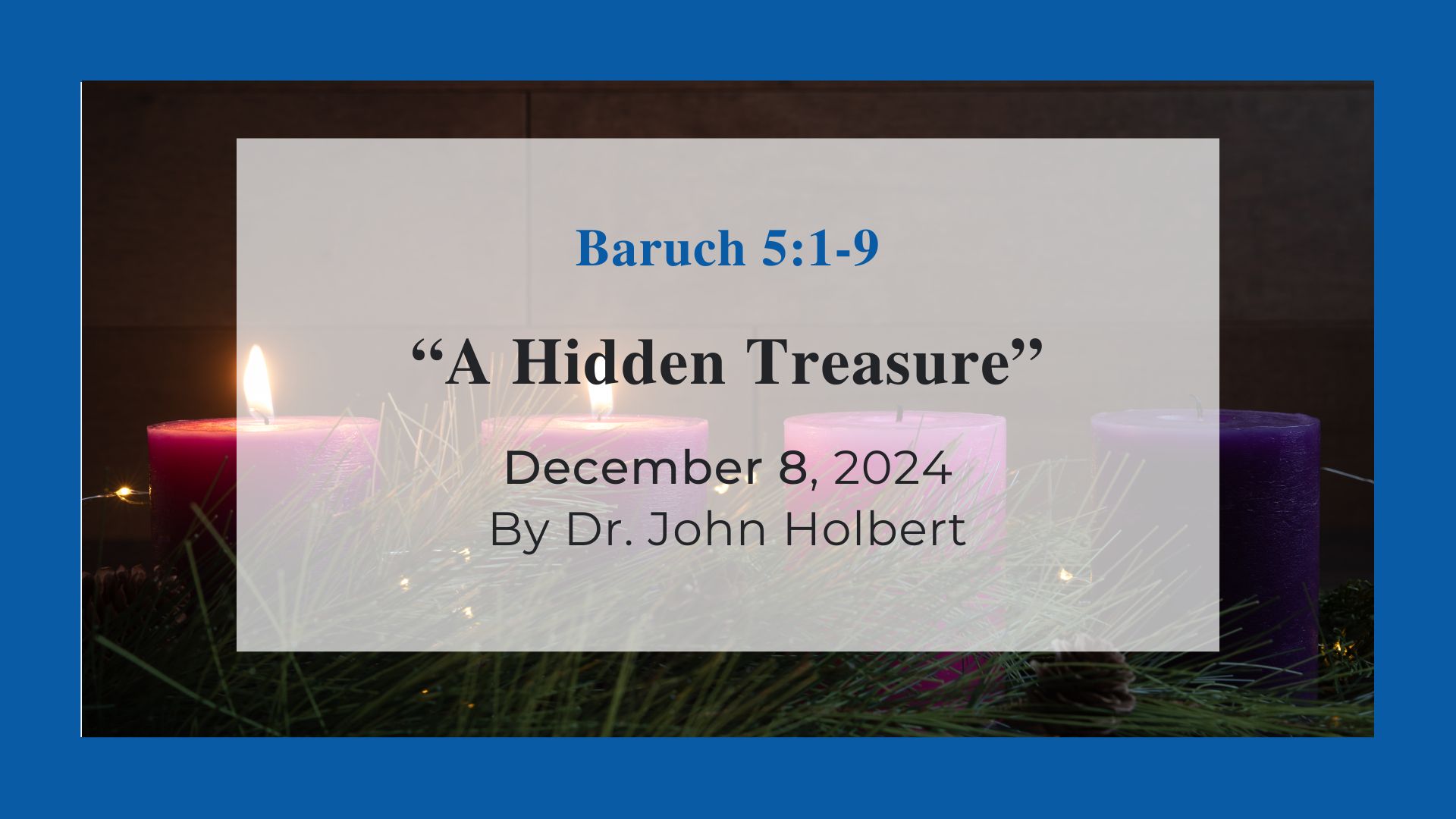A Hidden Treasure - Reflections on Baruch 5:1-9 for Advent2, Year C
by John Holbert on Thursday, November 28, 2024

You might well ask: “Why choose a text from the Apocrypha to use as the basis for a sermon in the second Sunday of Advent?” After all, many traditions do not even recognize the text of Baruch as sacred Scripture! The Westminster Confession plainly states that the books of the Apocrypha (from the Greek word for “hidden”) have no more authority than any other non-scriptural text. Why not use the far more familiar Malachi 3, an alternative text offered by the collectors of the lectionary? I have commented on the Malachi text several times over the years. Still, I am intrigued by the Baruch text, though it is in part derivative of any number of certain Hebrew Bible passages.
First, a few words about this rather enigmatic book. No one quite knows just when it was written; suggestions range widely, from slightly post-exilic (6th-5th century BCE) to as late as the 2nd century CE, though that latter date seems highly unlikely. Many scholars assume there is a Hebrew original for the book, but one has never been discovered—we have the book only in a Greek original. The title, Baruch, comes from the well-known figure from the book of Jeremiah, where Baruch is the prophet’s secretary and apparent confidante. It is not the first time that an ancient worthy’s name has been employed to give weight and heft to an otherwise unknown piece of literature (see, e.g. The Song of Solomon, a book having nothing whatever to do with the third king of Israel, and the several books ascribed to Enoch, that mysterious figure from Genesis who is said never to have died but was instead “taken by YHWH”). It should be said that 7th-6th century Baruch most certainly did not write this book.
Whenever it was composed, it presents a complex portrait, consisting of three compositions, demonstrating three literary genres, the last of which, a psalm of solace, includes our text for the day. Of course, because we have no certain historical context for the writing, it has been used in any number of ways to illuminate later historical settings. The early Christian communities no doubt used these words as further evidence that the coming of Jesus Messiah brings the “glory, mercy, and righteousness” that come only from God.
In fact, Baruch 5 reads rather like a commentary or recapitulation of several important and well-known texts from the prophet Isaiah. Like that 8th-6th century compendium of prophecy, Baruch assumes that the people of Israel have been dispersed among the nations in their Babylonian exile; that Zion has been deserted; that Israel’s enemies rejoice. However, Baruch, like Isaiah before him, promises that the people of Israel will return to Jerusalem, a Jerusalem that will regain its ancient splendor. “For God will give you (Jerusalem) evermore the name: ‘Righteous Peace, Godly glory’” (Baruch 5:4). This is reminiscent of last week’s Jeremiah text where Jerusalem in some distant but certain future will be named “YHWH is our righteousness.” Baruch, like Jeremiah, speaks of a God who has not forgotten the exiled people, but will bring them back to their glorious land and city.
In Baruch 5:5, the writer paints a portrait of an eager Jerusalem, watching anxiously as the children of the city “gather from east and west at the word of the Holy One,” and rejoices “that God has remembered them.” Then, echoing the famous words of Is.40, Baruch proclaims that “God has ordered that every high mountain, the everlasting hills, be made low, and the valleys filled up to make level ground, in order that Israel may walk safely in the glory of God” (Baruch 5:7). He concludes by promising that “God will lead Israel with joy, in the light of God’s glory, with the mercy and righteousness that come only from God” (Baruch 5:9).
It is easy to see how appropriate these lovely words are in this second Sunday of Advent. With the coming of Jesus Messiah to the world, the promise from God is for light and glory and mercy and righteousness, gifts that are poured out in the surprising person of the child at Bethlehem. With the coming of Jesus the world will never be the same; ancient promises will be fulfilled, and hope will spring up once again into a world in desperate need of such hope. Our world is no different; we too are in need of such hope and promise. And Baruch, that unknown book from an unknown time, written by an unknown author, speaks to us from its hiddenness and reminds us that God remains active among God’s people, most especially at this wonderful time of Advent. Rather like the child born in an inauspicious place—stall, stable, or cave— who becomes the savior of the world, so does Baruch speak his surprising and mysterious power to those with ears to hear.
